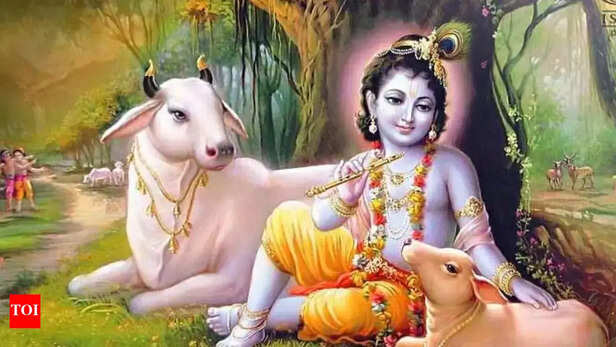If Krishna Taught You About Love Today, Would You Still Be Heartbroken? 7 Gita Truths That Hit Hard
Noopur Kumari | May 04, 2025, 14:07 IST

( Image credit : Times Life Bureau )
What if everything you believed about love was never really love at all? In a world full of heartbreak, ghosting, and emotional confusion, the Bhagavad Gita offers 7 timeless truths that challenge modern love at its core. This article dives deep into Krishna’s wisdom—not just to understand love, but to feel it in a way that heals, frees, and transforms your heart forever.
It seems harder than ever to define love in a society full of dating apps, romantic music, heartache sayings, and "situationships." We fear vulnerability but long for connection. Despite our great love, we tend to value other people more than ourselves. However, a holy dialogue between Krishna and Arjuna took place in the midst of a battlefield years ago, revealing the unvarnished, unafraid, and selfless nature of love. The Bhagavad Gita has the most profound insights on how to love without losing oneself; it is not just about philosophy or conflict. This ancient wisdom may have a profound impact on you, whether you've ever been hurt, confused, or just looking for love that lasts.

In the modern world, obsession—constant attention seeking, overanalysing responses, and unending texting—often entangles love. The Bhagavad Gita, however, makes a profound change: true love releases you from bonds rather than shackles you. Krishna advises Arjuna to behave lovingly but without regard for the results. Control and loss-averseness are not aspects of true love. It's about profound concern based on liberty. It is not weakness but strength to love someone enough to let them go, even if doing so means losing them. That's maturity, not detachment. That kind of love breathes; it doesn't suffocate. And it becomes divine in that breath.

These days, love frequently centers on "me"—my wants, my suffering, and my expectations. However, Krishna teaches in the Bhagavad Gita that the real adversary of love is ego. When Arjuna swallows her pride and confesses, "I don't understand." "Please lead me," Krishna says, starting to rouse his spirit. When ego dies, true love begins. Being humble and present is more important than establishing your value. Everything changes when we go from saying, "I need love," to saying, "I want to love selflessly." Love turns into a place of safety rather than a battleground. At that point, love begins to genuinely heal and cease to hurt.

We draw love that mirrors our inner world. As Krishna says, “The self is your best friend and your worst enemy.” When we’re unsettled within, we invite chaos into our relationships. But when we are at peace with ourselves, we attract love that feels calm, safe, and fulfilling. The Gita urges us to look inward—heal your wounds, confront your fears, and nurture your self-worth. Love shouldn’t feel like a battlefield. When you grow whole from within, you stop chasing people to complete you. Instead, you naturally attract a love that feels like home—steady, soulful, and aligned with your true self.

The unselfish, unadulterated, and profoundly unconditional beauty of Radha's love for Krishna is captured in the Bhagavad Gita. "Whatever you do, do it as an offering to me," Krishna instructs Arjuna, encapsulating the essence of genuine love: giving without expecting anything in return. In this type of love, there are no questions asked; the soul just knows the other. Such commitment seems uncommon in today's culture, where love is sometimes a transaction. However, it still exists—in silent hearts, in times of selflessness. This holy love simply flows; it neither demands nor possesses. And it makes a lasting impression on your soul the moment you catch a glimpse of it.

The majority of individuals long for love but avoid its responsibilities. When things get tough, we retreat, putting ego above effort and silence before conflict. However, Krishna told Arjuna to "stand up and fight" rather than to leave the battlefield. The same bravery is required for true love. It challenges us to speak honestly, to forgive deeply, to put effort before ease, and to stay when it would be easier to leave. The Gita reminds us that true power is found in those who fight for love, not in those who fear it, in a society when giving up seems easier than trying to resolve conflicts.

"You have the right to perform your actions, but not the results of your actions," is one of the Gita's most potent lessons. When it comes to love, it means that even if you can give your everything, you have no influence over how it turns out. Love isn't about writing a forever or pressuring someone to remain. It's about expressing your love completely, fearlessly, and freely. The act of letting go is an act of trust, not weakness. Have faith that what is meant for you will stay with you and that what goes will never really be yours to grasp.

In the 11th chapter, Krishna reveals his Vishvarupa—the cosmic form—showing Arjuna that the divine isn't something external but an essence that permeates everything, including within himself. This is the Gita's profound lesson: You are already complete, already love. Instead of seeking love from others, realize that the love you crave is within you. When you embrace your divine essence, you stop chasing incomplete connections. You attract love that mirrors your own wholeness. From this place of self-awareness, every relationship becomes a reflection of your inner peace, not a search for validation.
“He who sees Me in all beings and all beings in Me is never lost to Me, nor am I ever lost to him.” — Bhagavad Gita 6.30
Love is not always about romance. It’s about presence. Kindness. Sacrifice. Truth. Today, we confuse chaos with passion and toxicity with depth. But Krishna shows us another path—the path of conscious, calm, courageous love. A love that doesn’t break you but builds you. A love that isn't afraid of silence, space, or surrender. So, next time your heart breaks or your mind feels lost in love, turn to the Gita. You won’t find pickup lines—but you will find peace.
Explore the latest trends and tips in Health & Fitness, Travel, Life Hacks, Fashion & Beauty, and Relationships at Times Life!
1. Love is not attachment—it’s freedom

Love is not attachment
( Image credit : Times Life Bureau )
In the modern world, obsession—constant attention seeking, overanalysing responses, and unending texting—often entangles love. The Bhagavad Gita, however, makes a profound change: true love releases you from bonds rather than shackles you. Krishna advises Arjuna to behave lovingly but without regard for the results. Control and loss-averseness are not aspects of true love. It's about profound concern based on liberty. It is not weakness but strength to love someone enough to let them go, even if doing so means losing them. That's maturity, not detachment. That kind of love breathes; it doesn't suffocate. And it becomes divine in that breath.
2. True love begins when ego ends

True love
( Image credit : Pexels )
These days, love frequently centers on "me"—my wants, my suffering, and my expectations. However, Krishna teaches in the Bhagavad Gita that the real adversary of love is ego. When Arjuna swallows her pride and confesses, "I don't understand." "Please lead me," Krishna says, starting to rouse his spirit. When ego dies, true love begins. Being humble and present is more important than establishing your value. Everything changes when we go from saying, "I need love," to saying, "I want to love selflessly." Love turns into a place of safety rather than a battleground. At that point, love begins to genuinely heal and cease to hurt.
3. Your love reflects your inner self

kind of love
( Image credit : Pexels )
We draw love that mirrors our inner world. As Krishna says, “The self is your best friend and your worst enemy.” When we’re unsettled within, we invite chaos into our relationships. But when we are at peace with ourselves, we attract love that feels calm, safe, and fulfilling. The Gita urges us to look inward—heal your wounds, confront your fears, and nurture your self-worth. Love shouldn’t feel like a battlefield. When you grow whole from within, you stop chasing people to complete you. Instead, you naturally attract a love that feels like home—steady, soulful, and aligned with your true self.
4. Selfless love is the highest form of devotion

Selfless love
( Image credit : Pexels )
The unselfish, unadulterated, and profoundly unconditional beauty of Radha's love for Krishna is captured in the Bhagavad Gita. "Whatever you do, do it as an offering to me," Krishna instructs Arjuna, encapsulating the essence of genuine love: giving without expecting anything in return. In this type of love, there are no questions asked; the soul just knows the other. Such commitment seems uncommon in today's culture, where love is sometimes a transaction. However, it still exists—in silent hearts, in times of selflessness. This holy love simply flows; it neither demands nor possesses. And it makes a lasting impression on your soul the moment you catch a glimpse of it.
5. Real love demands courage, not comfort

Real love
( Image credit : Times Life Bureau )
The majority of individuals long for love but avoid its responsibilities. When things get tough, we retreat, putting ego above effort and silence before conflict. However, Krishna told Arjuna to "stand up and fight" rather than to leave the battlefield. The same bravery is required for true love. It challenges us to speak honestly, to forgive deeply, to put effort before ease, and to stay when it would be easier to leave. The Gita reminds us that true power is found in those who fight for love, not in those who fear it, in a society when giving up seems easier than trying to resolve conflicts.
6. Love grows when you let go of control

Love grows
( Image credit : Pexels )
"You have the right to perform your actions, but not the results of your actions," is one of the Gita's most potent lessons. When it comes to love, it means that even if you can give your everything, you have no influence over how it turns out. Love isn't about writing a forever or pressuring someone to remain. It's about expressing your love completely, fearlessly, and freely. The act of letting go is an act of trust, not weakness. Have faith that what is meant for you will stay with you and that what goes will never really be yours to grasp.
7. The love you seek is already within you

Krishna
( Image credit : Times Life Bureau )
In the 11th chapter, Krishna reveals his Vishvarupa—the cosmic form—showing Arjuna that the divine isn't something external but an essence that permeates everything, including within himself. This is the Gita's profound lesson: You are already complete, already love. Instead of seeking love from others, realize that the love you crave is within you. When you embrace your divine essence, you stop chasing incomplete connections. You attract love that mirrors your own wholeness. From this place of self-awareness, every relationship becomes a reflection of your inner peace, not a search for validation.
Let Love Be Your Dharma, Not Your Drama
Love is not always about romance. It’s about presence. Kindness. Sacrifice. Truth. Today, we confuse chaos with passion and toxicity with depth. But Krishna shows us another path—the path of conscious, calm, courageous love. A love that doesn’t break you but builds you. A love that isn't afraid of silence, space, or surrender. So, next time your heart breaks or your mind feels lost in love, turn to the Gita. You won’t find pickup lines—but you will find peace.
Explore the latest trends and tips in Health & Fitness, Travel, Life Hacks, Fashion & Beauty, and Relationships at Times Life!
